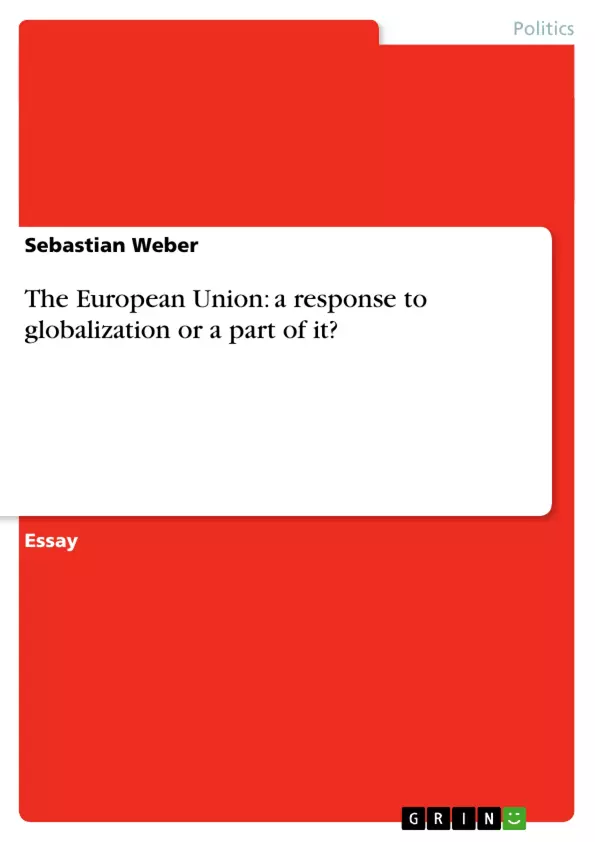The world order of today, unlike 50 years ago, is dominated by two phenomena: globalization and regionalism. Although globalization is the “word on everyone’s lips”, there are around 170 regional agreements today - half of these concluded since 1990 - with the European Union as probably the best known and the most unique one of these agreements (Moore 2000, p.1).
Whereas some argue that regionalism is a threat to the efficiency created through globalization), others regard it either as a mean to participate in the globalization process and therefore a part of it or the only “efficient response to the challenges of a continuously deepening polarization generated by the capitalist globalization process” (Ruggiero 1997, p.2; Moore 2000, p.3; Mittelman 1999, p.27; Amir 1999, p.54).
Whether regionalism contradicts globalization or complements it, depends heavily on the definition of both concepts as well as on the way a region acts within the framework of the global system (Hettne 1999, p.1).
In order to address the question, whether the European Union, as a regional project, is contributing or responding to globalization and with respect to Hettne’s above mentioned argument, the first chapter of this essay will set the framework for the following discussion by defining the two concepts – globalization and regionalism. Chapter three will give a brief overview of the European Union’s core policies and its framework as they are crucial to analysing the European Union’s role in the world system. Concluding from these two chapters the initial question will be addressed in chapter five, by an analysis of the policies of the European Union. A resume will be taken in the last chapter.
Inhaltsverzeichnis (Table of Contents)
- Introduction
- The concepts
- Globalization
- Regionalism
- The European Union: a brief overview
- The European Union in the context of globalization and regionalism
- Conclusion
Zielsetzung und Themenschwerpunkte (Objectives and Key Themes)
This essay aims to analyze the relationship between the European Union, as a regional project, and globalization. It examines whether the EU is a response to globalization or a part of it. The analysis focuses on the political and economic dimensions of both concepts.
- The definition and characteristics of globalization and regionalism
- The role of the European Union in the global economic and political system
- The impact of globalization on regional integration
- The European Union's policies and their impact on globalization
- The debate on whether regionalism is a complement or contradiction to globalization
Zusammenfassung der Kapitel (Chapter Summaries)
The introduction outlines the main argument and sets the context for the analysis, highlighting the significance of globalization and regionalism in the contemporary world order. Chapter two defines the concepts of globalization and regionalism, focusing on their political and economic aspects. The essay also analyzes the diverse interpretations and definitions of these concepts, drawing on relevant academic perspectives.
Chapter three provides a brief overview of the core policies and framework of the European Union, highlighting its key institutions and principles. This chapter aims to provide a foundation for understanding the EU's role in the global system and its relationship to globalization.
Chapter four delves into the relationship between the European Union and globalization, examining how the EU's policies and actions have shaped and been shaped by the globalizing forces.
Schlüsselwörter (Keywords)
Key terms and concepts explored in this essay include globalization, regionalism, regional integration, European Union, internationalization, political economy, trade, financial markets, and state-society relations. It investigates the debate on the role of regionalism in the context of globalization, analyzing the EU's contribution to and response to this global phenomenon.
Frequently Asked Questions
Is the European Union a response to or a part of globalization?
The essay explores both views: that regionalism like the EU is a tool to participate in globalization and an efficient response to its challenges.
What is the difference between globalization and regionalism?
Globalization refers to global integration (economic/political), while regionalism involves agreements between specific groups of countries (like the EU).
How many regional agreements exist worldwide?
As of the time of the essay, there were around 170 regional agreements, with half of them concluded since 1990.
Does regionalism contradict globalization?
The essay argues that it depends on the definition; regionalism can either threaten global efficiency or complement the global system.
What are the core policies of the EU discussed?
The essay looks at the EU's political and economic framework to analyze its role in the global world order.
- Quote paper
- Sebastian Weber (Author), 2003, The European Union: a response to globalization or a part of it?, Munich, GRIN Verlag, https://www.hausarbeiten.de/document/43055


